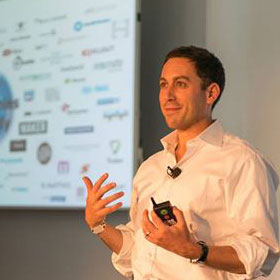Thoughts on Labor Day
Posted on .One of my entrepreneurs came to me a few months ago with a dilemma. He found a strong COO candidate, but this person was a long time family friend. They see each other every week at church, their kids are friends, and their wives sit together on the school board. If he hired this person and it didn’t work out, it had the potential to make his personal life miserable.
Most companies encounter a similar issue at some point; we often see relatives, siblings, and even spouses working together. Buddy Media is run by Michael and Kass Lazerow, a husband and wife team, and Linkshare was run by Stephen and Heidi Messer, a brother and sister team. These happen to be two examples where it worked out great, but VCs normally avoid husband-wife teams because we have seen the other side. I once dealt with two founders getting divorced and I wouldn’t wish that experience on anyone.
My advice to the CEO was to avoid hiring people that you can’t fire. If the candidate is a family member or close friend, and you have to see that person socially for the rest of your life, think twice before bringing him or her on board. Even the best relationships can sour in a tough environment.
This is a dismal theme on Labor Day, but the ability to hire and fire people quickly and inexpensively is why the US leads the world in start-ups. For every entrepreneur with a new business idea there are another four or five people with the same concept at the same time. It is as if the universe somehow decided that the time is right for a specific market. And to win the race you need the best people in every position. I have known many founders to work nights and weekends without pay, because that extra salary expense could be used for one more developer. I can’t help but contrast this with the national dialogue of permanent employment, tenure, collective bargaining, living wages, and unemployment benefits. It is as if there are two completely different countries out there – “start-up land” and “everything else” – where “start-up land” is a meritocracy and “everything else” is a game of musical chairs that has been winding down since the 1970s.
Unfortunately the entire economy could never be run like a start-up. Just look at the stats at the national level. There are 15,000,000 unemployed people in the US, but you can’t find one javascript programmer in New York City or San Francisco. The start-up market requires such high specialization that unemployment is always zero.
So, on this Labor Day, as the government ponders legislation to try and fix the broader economy, my only hope is that we don’t break the economic miracle that makes America a great place to start companies. The engine of innovation in this country is small business, it has always been small business, and it will continue to be small business as long as we have the flexibility to hire and fire quickly.

Ian Sigalow
http://sigalow.comIan is a co-founder and partner at Greycroft Partners in New York City. He has been a venture capitalist since 2001.
AUTHOR chrisfralic
Posted on 8:03 pm September 6, 2011.
I’m trying out livefyre on my own blog sigalow
AUTHOR idsigs
Posted on 8:14 pm September 6, 2011.
It is the best commenting system out there! @chrisfralic
AUTHOR davidweinfeld
Posted on 1:17 pm September 7, 2011.
Ian,
Thank you for the thoughtful post.
Would you agree that there’s a risk/reward balance to hiring a friend to work in your startup? Not only can working with a close friend be extremely enjoyable, but the existing relationship can support the ability to have more direct and honest conversations about your business.
I recognize the inherent risks in making such a hire, many of which you directly highlight in your post. What about the potential rewards?
AUTHOR idsigs
Posted on 6:34 pm September 7, 2011.
There are rewards to working with friends, and many coworkers become friends over time. The distinction I was making was around the dynamics between a CEO and an employee. At some stage in a company’s life there is a transition from a flat group with even responsibilities (“CEO and Chief Dish Washer”) to an organized workforce that reports to the CEO. CEOs of large companies generally have fewer friends at the office – it IS lonely at the top. Starting a company with your best friend is not a bad premise, but it has risks. It all depends on personal relationships.
AUTHOR davidweinfeld
Posted on 8:29 pm September 7, 2011.
@idsigs Thank you for the thoughtful response. I definitely see what you’re saying. I’m sure that for every positive friends working together story there is a negative one, if not more.